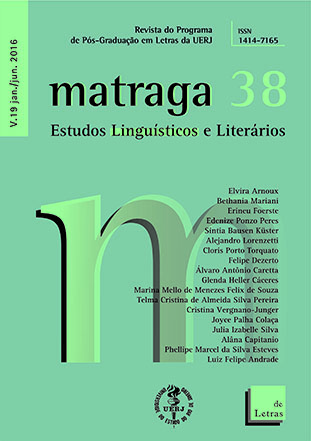Glottopolitical perspective in the study of linguistic instruments: theoretical and methodological aspects
DOI:
https://doi.org/10.12957/matraga.2016.20196Keywords:
Glottopolitics, linguistic instruments, grammars, rhetorics, contrastive analysisAbstract
This article assumes Glottopolitics as the study of the interventions in the space of language, which participate in the replication or transformation of societies. Just as these interventions depend on social processes, they also influence them from certain positions, which this analysis aims at identifying. Linguistic instruments, which regulate these practices, are considered glottopolitical gestures, and that is the reason why the conditions under which they are produced and circulate should be investigated. Within this framework and with special reference to grammars and rhetorics, this paper focuses on theoretical aspects such as the relationship between Glottopolitics and Linguistic Historiography, the temporalities which may be identified in the analysis and the spaces considered, the importance of intertext for interpretation, the social function of normative devices, and the construction of subjectivities, as well as on methodological aspects, such as the construction of series, the contrastive analysis of texts and reformulation.
---
Original in Spanish.
---
http://dx.doi.org/10.12957/matraga.2016.20196
Downloads
Downloads
Published
How to Cite
Issue
Section
License
Authorization
Matraga – Scientific Journal of the Post-graduate Program in Arts and Humanities of UERJ is authorized to publish the article submitted here, if it is accepted for online publication. It is attested that the contribution is original, that it is not being submitted to another publisher for publication, and that this statement is the expression of truth.
The works published in Matraga's virtual space – Scientific Journal of the Post-graduate Program in Arts and Humanities of UERJ will be automatically transferred, and your copyright is reserved to Matraga. Its reproduction, in whole or in part, is conditional on the citation of the authors and the data of the publication.

Matraga uses license Creative Commons - Attribution-Non-Commercial 4.0 International.





